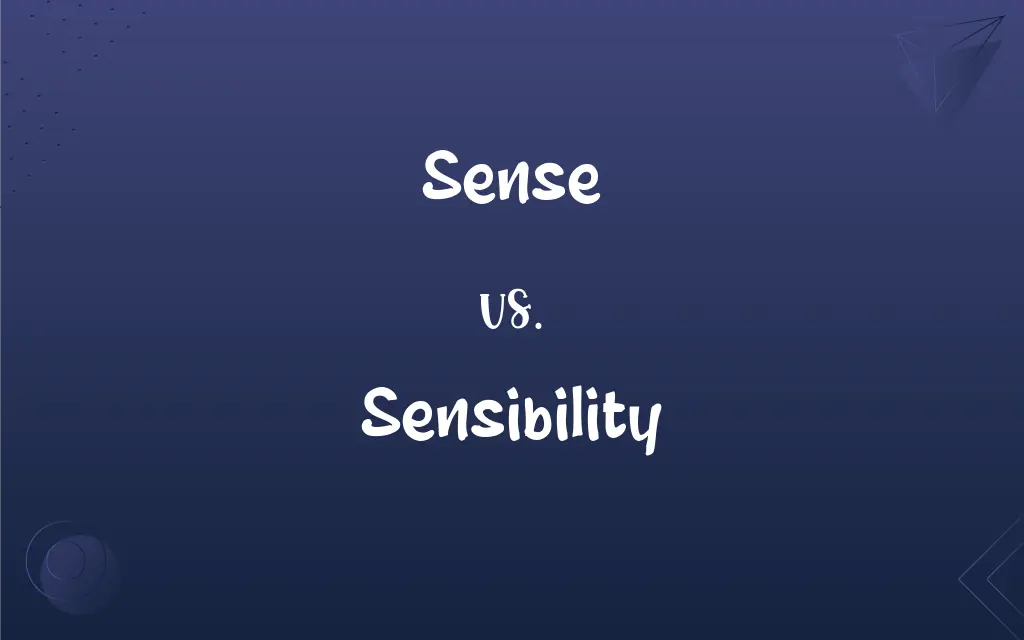Sense vs. Sensibility: What's the Difference?
Edited by Janet White || By Harlon Moss || Updated on November 13, 2023
"Sense" refers to logical thinking, perception, or understanding, while "sensibility" denotes sensitivity to emotional or aesthetic matters.

Key Differences
"Sense" involves practical or logical reasoning, whereas "sensibility" is more about acute emotional awareness and responsiveness.
In literature, "sense" often signifies rational thought, in contrast to "sensibility," which implies emotional or intuitive responses.
"Sense" can relate to a physical perception (like the five senses), while "sensibility" encompasses a more refined or delicate appreciation, particularly of art or beauty.
"Sense" also implies sound judgment, whereas "sensibility" may involve a heightened, sometimes overly emotional reaction.
In decision-making, relying on "sense" suggests a logical approach, while using "sensibility" might indicate a decision influenced by emotions or aesthetics.
ADVERTISEMENT
Comparison Chart
Definition
Logical reasoning, perception
Emotional sensitivity, appreciation
Context of Usage
Practical, rational thought
Emotional, aesthetic responsiveness
Associated with
Intelligence, understanding
Empathy, artistic appreciation
Typical Usage in Speech
Referring to logic or perception
Discussing emotional or aesthetic depth
Literary Connotation
Rational characters or themes
Emotionally driven characters or themes
ADVERTISEMENT
Sense and Sensibility Definitions
Sense
Sound judgment or practical intelligence.
It's common sense not to spend more than you earn.
Sensibility
Capacity for refined emotional reactions.
His sensibility to poetry made him an excellent critic.
Sense
Capacity to perceive or feel.
She had a keen sense of smell.
Sensibility
Acute emotional perception or responsiveness.
Her artistic sensibility was evident in her paintings.
Sense
A feeling about something.
He had a sense that something was wrong.
Sensibility
A tendency to feel emotional responses intensely.
His strong sensibility often led him to empathize deeply with others.
Sense
Awareness or understanding.
He quickly got the sense of the new software.
Sensibility
The quality of being easily emotionally affected.
The movie's tragedy moved her sensibility.
Sense
Meaning or significance.
Her words had a deeper sense than we realized.
Sensibility
Appreciation of or responsiveness to art or beauty.
She had a remarkable sensibility for music.
Sense
Any of the faculties by which stimuli from outside or inside the body are received and felt, as the faculties of hearing, sight, smell, touch, taste, and equilibrium.
Sensibility
The ability to perceive stimuli
Lost sensibility in a toe.
Sense
A perception or feeling produced by a stimulus; sensation
A sense of fatigue and hunger.
Sensibility
Mental or emotional responsiveness, especially in being offended or in having one's feelings hurt
"The earthy humor of many of the ballads deeply offended her sensibilities" (Anne Stott).
Sense
Senses The faculties of sensation as means of providing physical gratification and pleasure.
Sensibility
The capacity to respond intelligently to refined emotions, especially in art
"They celebrated deeds that fit stereotyped images of noble valor, making the writing flat and tedious to modern sensibilities" (David A. Bell).
FAQs
Can "sense" refer to physical perception?
Yes, "sense" can mean physical perception, like the five senses.
How is "sensibility" different from sensitivity?
"Sensibility" implies a refined or acute emotional or aesthetic response, more nuanced than general sensitivity.
Is "sense" used in a scientific context?
Yes, "sense" is used in both everyday and scientific contexts.
Is "sensibility" associated with rationality?
No, "sensibility" is more related to emotional and aesthetic awareness.
Can "sense" refer to a general feeling?
Yes, "sense" can also mean a general, often intuitive feeling about something.
Does "sensibility" always imply a positive quality?
Not necessarily; "sensibility" can sometimes be seen as excessive emotionalism.
Is "sense" innate or learned?
"Sense" can be both innate and developed through experience.
What is the primary meaning of "sense"?
"Sense" primarily refers to logical reasoning or perception.
Does "sense" imply practical intelligence?
Yes, "sense" often implies practical intelligence or sound judgment.
Can "sensibility" be learned or developed?
Yes, "sensibility", especially in art or beauty, can be cultivated.
How does "sense" relate to decision-making?
"Sense" in decision-making refers to a logical, reasoned approach.
Can "sensibility" affect personal relationships?
Yes, a person's sensibility can greatly affect how they relate emotionally to others.
Is "sense" a versatile term?
Yes, "sense" is versatile and used in various contexts, from practical to perceptual.
Does "sensibility" imply a deeper understanding?
"Sensibility" often implies a deeper, more intuitive understanding, especially of emotional or aesthetic aspects.
Can "sense" be synonymous with meaning?
Yes, "sense" can also mean the meaning or significance of something.
How does "sense" apply in technology?
In technology, "sense" can refer to the detection or measurement of physical properties.
Can "sensibility" influence artistic expression?
Yes, "sensibility" greatly influences one's artistic expression and appreciation.
Is "sensibility" considered a desirable trait?
"Sensibility" is often considered desirable, especially in artistic or empathetic contexts.
Does "sensibility" have a role in literature?
Yes, "sensibility" often plays a key role in literary themes and character development.
Is "sensibility" a common term in everyday language?
"Sensibility" is less common in casual speech and more often used in artistic or emotional contexts.
About Author
Written by
Harlon MossHarlon is a seasoned quality moderator and accomplished content writer for Difference Wiki. An alumnus of the prestigious University of California, he earned his degree in Computer Science. Leveraging his academic background, Harlon brings a meticulous and informed perspective to his work, ensuring content accuracy and excellence.
Edited by
Janet WhiteJanet White has been an esteemed writer and blogger for Difference Wiki. Holding a Master's degree in Science and Medical Journalism from the prestigious Boston University, she has consistently demonstrated her expertise and passion for her field. When she's not immersed in her work, Janet relishes her time exercising, delving into a good book, and cherishing moments with friends and family.
































































